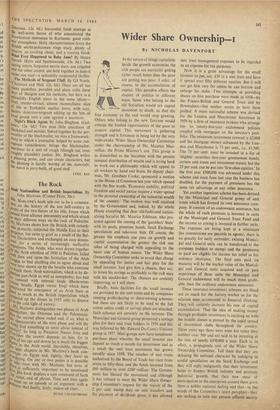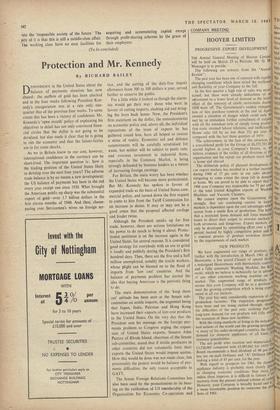Wider Share Ownership —I
By NICHOLAS DAVENPORT IN the nature of things capitalistic inside the growth economies the rich people are inevitably getting richer much faster than the poor are getting less poor. I refer, of course, to the accumulation of capital. This paradox affects the student of politics in different ways. Some who belong to the old Socialism would tax capital increment to death, so that the free economy in the end would stop growing. Others who belong to the new Toryism would enlarge the limited opportunities of the poor to acquire capital. This movement is gathering strength and is fortunate in being led by the very wide-awake 'Wider Share Ownership' Committee under the chairmanship of Mr. Maurice Mac- millan, the Prime Minister's son. This group is as dissatisfied as the Socialists with the present unequal distribution of wealth and is trying hard to work out a philosophy which will appeal to all workers by hand and brain. Its deputy chair- man, Mr. Gresham Cooke, sponsored a motion in the House of Commons last year which opened with the fine words, 'Economic stability, political freedom and social justice require a wider spread in the personal ownership of the industrial wealth of the country.' The motion was well received by the Government and, indeed, by the whole House excepting that dear old-fashioned nation- alising Socialist Mr. Maurice Edelman, who pro- tested against the coming of the 'gamblers' State' with its pools, premium bonds, Stock Exchange speculation and take-over bids. Of course, the greater the emphasis one puts on growth and capital accumulation the greater the risk one takes of being charged with appealing to the baser side of human nature. The Wider Share Ownership Committee seeks to avoid that charge by appealing for justice and fair play for the small investor. Just give him a chance, they say, to invest his savings as profitably as the rich man with his stockbroker. The chances are certainly improving, as I will show.
Briefly, basic facilities for the small investor are provided by the unit trusts and by companies running profit-sharing or share-owning schemes; but these are not likely to be used to the full extent unless credit or savings plans are attached. Such schemes are certainly on the increase. The Municipal and General group pioneered a savings plan for their unit trust holders in 1954 and this was followed by Mr. Edward Du Cann's Unicorn group in 1957. Most groups now have instalment- purchase plans whereby the small investor can deposit so much a month for investment and as a result the unit trust movement has grown steadily since 1958. The number of unit trusts authorised by the Board of Trade has risen from seven to fifty-three and the funds invested from £60 million to over £200 million. The Govern- ment has blessed the movement and although it has refused to meet the Wider Share Owner- ship Committee's request for the waiver of the 2 per cent. stamp duty on unit transfers and Air payment of dividends gross, it has allowed unit trust management expenses to be regarded as an expense for tax purposes.
Now it is a great advantage for the small investor to put, say, £50 in a unit trust and have it spread over fifty different equities. But it will not get him very far unless he can borrow and enlarge his stake. Two attempts at providing shares on hire purchase were made in 1958—by the Franco-British and General Trust and by Bowmakers—but neither seems to have been pushed. A more successful scheme was devised for the London and Manchester Assurance in 1959 by a firm of insurance brokers who arrange ten- to twenty-five-year endowment policies coupled with mortgages on the investor's port- folio. The minimum investment covered is £2,000 and the mortgage money advanced by the Lon- don and Manchester is 75 per cent., i.e., £1,500. The 75 per cent. must be invested in a list of 'eligible' securities (ten-year government bonds, certain unit trusts and investment trusts), but the 25 per cent. can be put into 'first-class equities.' In the first year £500,000 was advanced under this scheme and since June last year the business has doubled, for the payment of premiums has the same tax advantage as any other insurance.
Yet another ingenious scheme has been devised by the Municipal and General group of unit trusts which has formed its own assurance com- pany. It consists of an endowment assurance, but the whole of each premium is invested in units of the Municipal and General Trust Fund and the income so arising is invested in further units. The expenses are being kept at a minimum (no commissions are payable to agents), there is no penalty for early surrender, existing Munici- pal and General units can be transferred to the company (subject to stamp) and the premiums so paid are eligible for income tax relief as for ordinary insurance. The final sum paid on maturity will be the market value of the Munici- pal and General units acquired and on past experience of these units the Municipal and General endowment will be much more profit- able than the ordinary endowment assurance.
These insurance-investment schemes are fitted not so much for the factory worker as for the salaried man accustomed to financial thinking. They will certainly increase his rate of capital accumulation. That the idea of making money through profitable investment is catching on with the middle classes is proved by the rapid spread of investment clubs throughout the country. Three years ago there were none but today they number over 500 and are said to be investing at the rate of nearly £450,000 a year. Each is, in effect, a propaganda unit of the Wider Share Ownership Committee. Tell them that they are debasing the national character by indulging in sordid speculation on the Stock Exchange and they will reply indignantly that their investment helps to finance British industry and promote industrial growth, that their new sense of participation in the enterprises around them gives them a nobler national feeling and that--in the words of the Committee's latest pamphlet they are seeking to turn our present affluent society
into the 'responsible society of the future.' The pity of it is that this is still a middle-class affair. The working class have no easy facilities for acquiring and accumulating capital except through profit-sharing schemes by the grace of their employers.
(To be concluded)







































 Previous page
Previous page